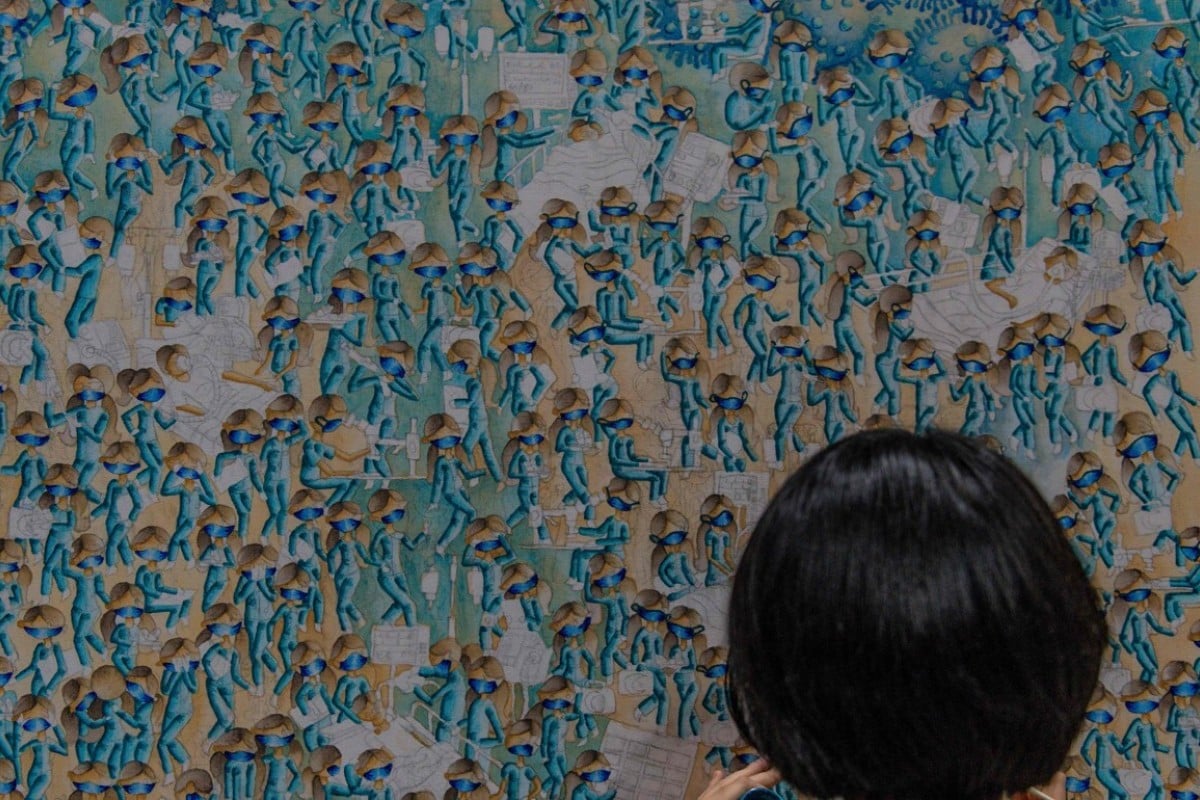
Generation Z fights against inequality and Covid-19 using art, technology and political commitment
- From Paris to Chile to Malaysia, young adults around the world are helping their communities during the coronavirus lockdown
- Young people say they are optimistic that the world will learn lessons through the crisis
 Wan Jamila Wan Shaiful Bahri, 17, paints in Shah Alam, on the outskirts of Kuala Lumpur. (Photo by Mohd RASFAN / AFP)
Wan Jamila Wan Shaiful Bahri, 17, paints in Shah Alam, on the outskirts of Kuala Lumpur. (Photo by Mohd RASFAN / AFP)With their art, technology know-how, creative social networking skills and political commitment, post-millennials, known as Generation Z, have found their own ways to help others through the coronavirus lockdown.
From Colombia to Senegal, Malaysia to North Macedonia, a group of 15- to 24-year-olds are putting their energy and skills to use within their communities.
German Swiss International School students give back to the community
Tapping into creativity
At 15, Romeo Estezet, a Paris secondary school student, has turned his bedroom into a 3D printing workshop and is producing 80 protective visors a day.
“My dream is to show other young people the usefulness and, above all, the ease of this technology, which puts the production of objects within everyone’s reach”, especially in a crisis, he says.
In North Macedonia, secondary school student Eva Stojcevska found a way to keep her passion for drama alive despite the cancellations of performances.
To save her school’s annual cultural festival, the 16-year-old from Skopje and her friends reorganised it on Facebook instead, where several dozen people took to the virtual stage for live shows.
With more than 40,000 views and rave reviews, it “turned out a lot better than expected”, she says.
Four friends use their free time for a good cause
The art of isolation
Art has helped some youngsters overcome the confines of lockdown and health conditions while living in small flats.
Wan Jamila Wan Shaiful Bahri, a 17-year-old autistic painter from Malaysia, devotes her time to creating her Our Heroes series as a tribute to front-line workers.
“I compile all the stories I see in the daily news regarding the virus,” she says. Better known under the name Artjamila, the teen proudly shows one of her paintings, depicting people dressed in blue, with big, dark eyes looking worried above their masks. This artwork won first place in the Artdialogo Asia competition.
Wan Jamila Wan Shaiful Bahri poses for pictures with her winning painting. (Photo by Mohd RASFAN / AFP)
Drones and bikes
Jose Otero, a 22-year-old Venezuelan living in Colombia, has come up with what he describes as a low-cost drone to beat the travel restrictions by carrying medicine and test results around the northern city of Barranquilla.
“They used to tell us that we had to separate ourselves from technological devices or telephones because that separated us,” he says. “On the contrary, right now it is what unites us.”
In Senegal, engineering student Ibrahima Cisse, 23, and his friends at Dakar’s ESP Polytechnic Higher School built a special bicycle equipped with a loud speaker, to share preventive information, and a hand sanitiser dispenser.
He says they are learning to take into account the environment and people’s needs.
The Hong Kong teen helping students in India learn during the coronavirus
Interrupted revolutions
From Hong Kong to Santiago and in other cities too, the pandemic forced the temporary suspension of demonstrations for change by pro-democracy movements.
But, says 24-year-old Camila, from Chile, they are only on pause. Preferring not to divulge her surname, she says that she had taken part in protests against social inequality in her country since the end of October last year.
In the face of exploding unemployment in Santiago, some residents have already defied the lockdown to demonstrate and call for food aid. And, warns Camila, when the pandemic is over, many will take to the streets again because they have lost a loved one and the government did not look after them.
Encouraging animal adoption through ‘Pets of Hong Kong’
Beyond the smartphone
“If I don’t volunteer and those like me don’t volunteer, then who will?” asks Malak Sabah, 24. She has been the linchpin of an initiative to sanitise the streets of Lebanon’s overcrowded Wavel Palestinian refugee camp, where she grew up.
Worried that some were not taking the virus seriously enough, Sabah launched an awareness campaign. “It’s a hidden virus, you can’t deal with it with physical strength; it requires awareness, knowledge and protection,” she says.
Having always known a world connected by Google, Facebook and Amazon, this generation understands the power of social networks in getting a message across, Walid Badi, a French professional handball player, says. Not only that, but these young people also realise they are best placed “to help the most vulnerable”, the 24-year-old says.
The health crisis showed that “we’re not just good for staying at home, hooked to our smartphones, but are deeply rooted in reality”, he adds. During lockdown, he took action through his Solidaritess association to help the homeless, distributing clothes to them.
Connecting during social distancing with exercise
As for the future?
As well as feelings of injustice and, at times, anger, the young people say they have great optimism and hope that positive lessons will be learned from the unprecedented crisis.
“I hope that people will be more aware of their health, more aware of the environment around them and understand that even their smallest steps can influence everyone,” says Stojcevska.
Badi, the sportsman, longs for society to be more focused on equality and social cohesion.
Sabah, the refugee, knows that hard times still lie ahead. “But they won’t last forever,” she says.